Counseling center "Jefimija" was established in 2000 as a health professional of the Women's Center of Uzice, and since 2013 it has been functioning as an independent association. Slavica Simić, president and one of the founders and members of the association, Stanka Jakšić, Gordana Marijanović, and Biljana Terzić told us about the support for women suffering from and treated for breast cancer, what advocacy activities Jefimija conducts and how contributes to the community daily.
How was your organization established? How did your mission develop?
Slavica: "Jefimija" was created in 2000, first, within the Women's Center of Uzice, as a health program. Even then, we dealt with the rights and lives of women in Serbia, and the immediate reason was a meeting with a young mother (she breastfed her baby then). She had a kind of monologue at the surgeon's examination in which she convinced herself that she would be cured and her husband is modern, that there would be no problems. That was when the psychologist, who was herself at the check-up, turned to the doctor (Maja Gulan) and asked if there was any support for women with breast cancer.
Since it did not exist, we realized that we could and wanted to do something about it. We founded the Counseling Center for Women with Breast Cancer 'Jefimija.' We soon started lecturing and directly inviting women diagnosed to come to "Jefimija." We recognized the need of women for timely, understandable information, emotional and psychological support, support from someone who has the experience, social support during rehabilitation ...
At the same time, it was recognized that there is a gender condition of women's diseases. Their overburdening with numerous roles (both traditional and modern) with a lack of decision-making power puts women in a position of exhaustion, self-neglect, and late visits to the doctor.
Diagnosis often occurs when several factors are linked, such as age (at most the fifth and sixth decades of life), lack of support, exhaustion, and marginalization of women (when they mostly end up with their active parenting and partner role). At that moment, the woman herself, the family, and the social system must understand her needs.
Our program was a response to this situation and is based primarily on the needs of women, especially the sick. We have developed a program that contains:
Preventive activities - lectures and promotions, forums and media appearances, campaigns, with the aim of:
1. that women come to the first examinations as soon as possible, and then regular check-ups;
2. to understand what breast cancer is, why it occurs; to assess how much they need to do for their self-preservation, and, very importantly, that breast cancer is curable and can be kept under control even when it is in the metastatic phase;
3. that breast cancer is visible to the public as a disease like all other chronic and that there is no taboo topic related to this area.
Support service for women diagnosed with breast cancer - experiential support (in the hospital, through self-help and on-call groups, open telephone), psychological empowerment and support (individual counseling, psychological workshops, psychotherapy, telephone); information on diseases and findings and health support (health workshops, open phone).
Increasing the availability of all forms of support for women in the Zlatibor district- since 2014 and regularly since 2017, through the project We are here for you, we hold regular activities of all forms of support in 4 more cities (Sjenica, Prijepolje, Nova Varos, Bajina Basta).
Development of the first (2006) Guide for women with breast cancer with the understandable information about the disease, ways of diagnosis and treatment, psychological problems of women, families and the environment, and institutions that can be contacted.
Impact on health system and policy:
1. suggestions for improving procedures through the identification of deficiencies in diagnostic treatments (e.g., treatment of lymphedema and methods for histopathological findings in a regional hospital);
2. raising the issue of the availability of chemotherapy in all secondary health care institutions in Serbia (the first years of the 21st century);
3. participation in the development of two national plans for women's health; sensitization of health workers (primary and secondary health care, final year students) to women's gender issues and position, reasons for their delay in examinations, and the need to never return them when they arrive;
4. Participation in stones for several free aids (wigs, prostheses, orthopedic bras; elastic sleeves against lymphedema should never be approved!) And receiving modern therapies for primary and metastatic breast cancer.
Cooperation with other organizations dealing with breast cancer- at the European level (EUROPE DONNA), regional level (Macedonia, BiH, Croatia, Slovenia, Montenegro), national - co-founders of NALORA (National Association of Cancer Patients), EUROPE DONA OF SERBIA (Serbian forum against breast cancer), cooperation with other organizations and associations dealing with breast cancer, but also other patient organizations; participants in all events of regional and national importance.
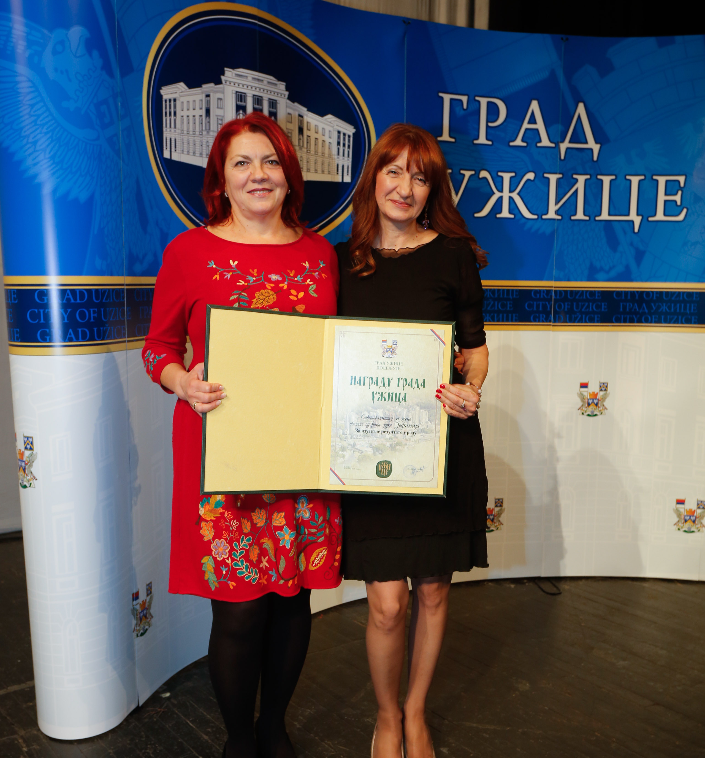
Osnivačice udruženja, Maja Gulan i Slavica Simić
What was your motivation for working in the non-profit sector?
Slavica: I have dealt with the position of women before, and I have a chronic disease that can be life-threatening. This sensibility helped me recognize all the aspects that affect women's illness, the need for support, and changes in the health system and society that should enable the realization of the state of general well-being for women, 52% of whom are in the population.
For 22 years, this has guided my work and engagement, recognizing needs and bottlenecks and developing programs that would be a response to that situation. My work is characterized by a gender approach to women's health.
Gordana: I came to "Jefimija" to help myself, surrounded by women who went through what I went through.
I started engaging in experiential support activities because I went through the disease, gained valuable experiences that helped me accept my illness, get to know it, and monitor my condition. I consider the most significant benefit in this situation soberly thinking about the further course of my disease and life. In addition, I learned a lot by questioning my own life.
I wanted to pass on to other women going through the disease and help them if I survived, so can those that the disease is not the end but can be the beginning of self-knowledge and a new life that can be much better and more meaningful than before.
I help women get to know their disease, accept it and improve their lives. In addition, I have new goals in life, and I feel useful.
Stanka: My arrival in "Jefimija" was necessary for me to get rid of the fears that the diagnosis of the disease brought me. And the only thing I could get there was because I had professional help (doctor, psychologist) and valuable experiences of women who survived the disease. It helped me get through the condition more effortless, to continue living, but this time much wiser, learning where I was wrong, not repeating mistakes by changing habits and starting to hang out with positive people, avoiding negative situations and people.
By engaging in "Jefimja", I want to help others and strengthen women as they have given me and strengthened me to overcome illness and be a better version of myself. I want to be helpful, contribute to the well-being of others, and, perhaps, get involved in humanitarian work to be better, easier, and more useful for all of us.
Biljana: When I was sick, I was terrified and thought there was no help for me. A woman from Jefimija who survived the disease showed me that it is possible to live with this diagnosis, that it is not the end. That experience meant the most to me in terms of faith in healing because I had a living woman in front of me, who looked beautiful, was happy, laughed, and sympathized with me.
By realizing how much she meant to me, I realized how much every woman in that situation needs that help. That is why I am now providing experiential support to newly ill women and those being treated, who face various problems since the treatment is long and demanding. My biggest reward is when I see a significant change in their eyes, mood, and body position (which happened to me, after that conversation, I corrected myself). I understand how much I have strengthened, developed, and changed through this work.
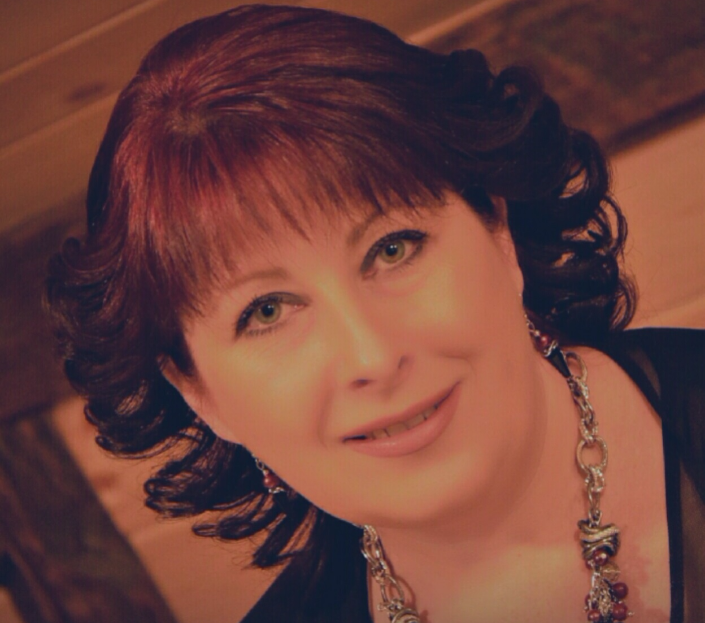
Biljana Terzić
How did the COVID-19 crisis affect the work of the association? How much has the way you operate changed? What activities have you been most focused on in the past two years?
Slavica: Fortunately, we coped with the COVID-19 crisis very quickly, and we practically did not have any activities for half a month at the beginning of the state of emergency. We promptly organized through the zoom platform, opened the phone, and had regular group activities and individual support. Later, we adhered to all epidemiological measures in everyday activities. We maintained the experiential support regularly in OB Užice when there were operations because a nurse working in the hospital is a member of our experiential support team. We forwarded all available important information (vaccination, examinations, chemotherapy, radiation, recording, scheduling ) to all women from the Zlatibor district and through the Viber municipal groups we formed.
Funding was without additional funds compared to the usual.
How is the Counseling Center "Jefimija" financed? What different types of donors do you work with, and how? In what ways can those who want to support the organization's work?
Slavica: "Jefimija" Counseling is funded by the project. The problem with financing our organization is that we have a developed but continuous support program, which is not interesting for many donors because it is not one-time. It is also often not in line with the key topics for which donors give money.
We have survived for more than two decades, thanks almost always to domestic feminist-type donor organizations focused on women's rights and health care. These were the Open Society Fund, BCIF, and international feminist foundations (Global Fund for Women, VGIF, the embassies of Canada and the Netherlands). Our majority donor has been the Reconstruction Women's Fund Belgrade for nine years. These donations cover 50-70% of our budget, depending on how much we raise. The Ministry of Health has twice supported our activities with modest funds. From 2018, the City of Uzice will help our organization by about 20% by covering current costs and only a small part of activities. We receive other donations from two pharmaceutical companies (never more than 5-6% in total) and occasional private contributions. From socially-responsible companies, we have free internet from MTS and occasional donations in the past in equipment or for part of the activities (AVON, Lottery of Serbia, ATLAS).
Donors can support us with funds to ensure continuous and complete maintenance of our activities as we have provided working conditions.
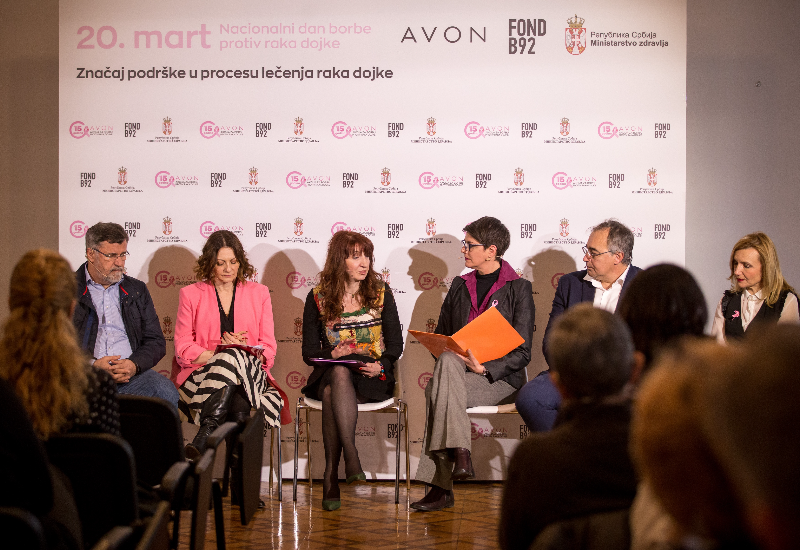
How do you involve the community in your work, and what does it bring to you?
Slavica: Through cooperation since the beginning of the organization's existence, logistical collaboration has been established with the Health Center and the General Hospital of Uzice and the municipality of Uzice. Regarding the Health Center and the hospital, cooperation means that we have access to hospital rooms, and our suggestions are accepted (treatment of lymphedema, experiential support in breast surgery rooms, demonstration of physiotherapy exercises; tips for adjusting appointments for women coming from abroad; counseling women to turn to 'Jefimija' for psychosocial support, sensitization of health workers, etc.).
Until 2018, the municipality mainly supported us logistically (lecture rooms), and since then, specifically by providing funds for space costs and a small part of the activities. Since 2002, we have been selling flower seedlings on the street to raise funds and promote health (Flower that means life), so we have been present for 20 years, and flower growers and some citizens are spontaneous donors. The municipality has been the patron and caravan of Giving pedal to cancer for five years. Since its establishment and Race for the girl, we have supported it, which we realize with Europa Dona Serbia and Think pink association, part of European coalitions. There is also the celebration of Healthy Breasts Day and Pink October, which we have realized for more than ten years.
A special form of our community involvement is cooperation with the municipalities of Cajetina, Nova Varos, and Prijepolje, which help us by providing space for activities in cultural centers through the media. We hope that from this year, it will be the municipality of Sjenica. In the first years of work, we were very active in the municipalities of Arilje and Požega (workshops and lectures, and media appearances).
This cooperation helps us make the topic and contents of our work visible, which directly affects the reduction of fear of disease and actualizes the system's problems and women - patients, families, rehabilitation. For this period of existence, we have preserved integrity and reputation.
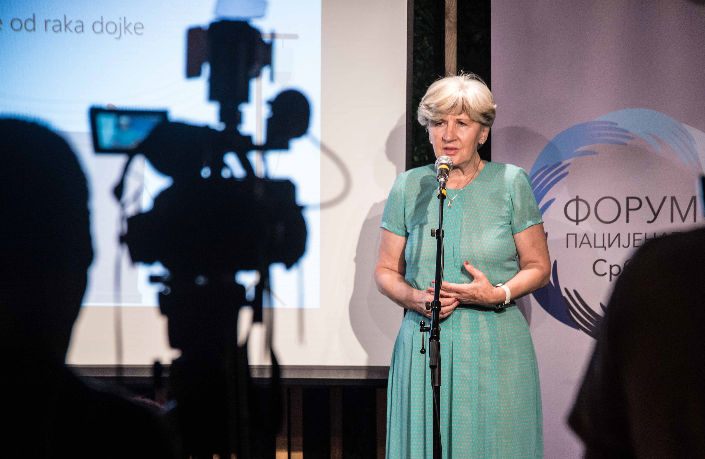
Gordana Marijanović
What activities are you currently most focused on? What are the most important plans and goals that you plan to realize in the future?
Slavica: Essentially, we are always focused on supporting and strengthening women diagnosed with breast cancer: experiential support (in hospital, through self-help and on-call groups, helpline), psychological empowerment and support (individual counseling, psychological workshops, psychotherapy, hotline); information on diseases and findings and health support (health workshops, open telephone).
We provide the availability of our support through sets of workshops in the cities of the Zlatibor district through the project We are there for you.
We are still part of all campaigns (for preventive examinations, innovative therapies, free orthopedic aids and rehabilitation programs, elimination of discrimination in sick leave depending on the workplace, etc.).
We have a need and a task to transfer our experiences to other patient associations through pieces of training. This is also one of the tasks we want to realize in the coming period. For this task, we need financial support to expand our work model, which has proven to be successful because we tend to reduce mortality.
Although the incidence of breast cancer in the Zlatibor district is higher (57 / 100,000) compared to Serbia (54 / 100,000), mortality from breast cancer is lower (11 per 100,000) compared to Serbia (19 per 100,000). In the Zlatibor district, breast cancer screening response is far higher than in the rest of Serbia.
At the same time, it is necessary to continue with the sensitization of health workers and the whole society that the occurrence and late detection of breast cancer in our women are gender conditioned and a consequence of their position and the burden they carry in Serbia.
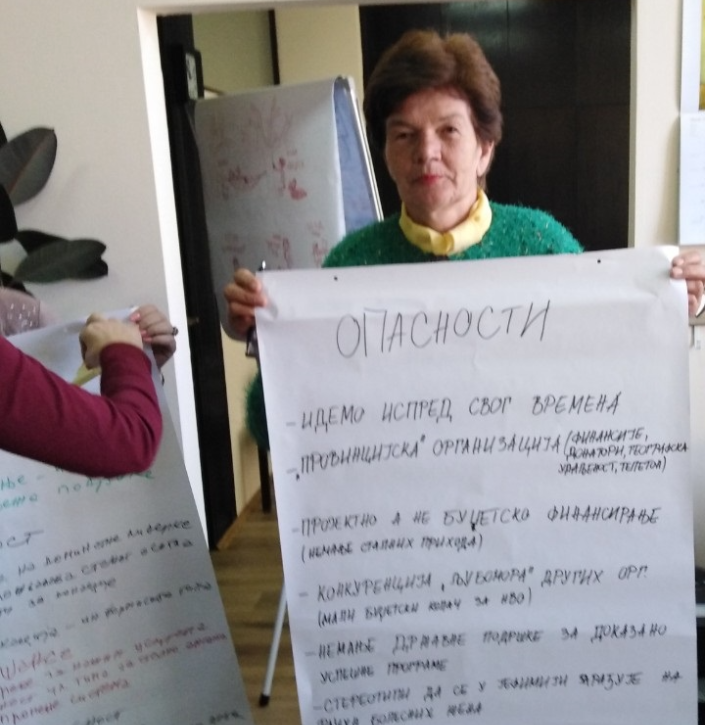
Stanka Jakšić
One of the essential segments of your work is advocacy. What do your advocacy activities look like, and are there any results you are incredibly proud of?
Slavica: Our advocacy activities with other associations and institutions are numerous, from participation in the development of national plans for women's health (one of which was based on the principles of gender equality) to the introduction of new therapies (Fearless, Stronger than Fear, Life is valuable), free bras and wigs, elastic sleeves for the prevention of lymphedema of the hand (which we have not yet achieved), making printed information materials about procedures and steps in treatment, written in understandable language for women and the like.
Among our most significant contributions are our achievements in the first years of the 21st century to make chemotherapy available in all health centers. At that time, patients in the interior of Serbia had to buy chemotherapy that was later refunded. We have achieved this by alerting the public through the media and our street action Flower that life means.
One of the essential issues that we have in mind and should be advocated for is that women diagnosed with breast cancer are equalized in sick pay. We want them to have 100% compensation, not 65%, as if they had the flu or some other disease that is temporary and not so expensive to treat.
Do you cooperate with other non-profit organizations and associations, by which and how?
Slavica: Yes. With all patient organizations and those dealing with breast cancer, feminist organizations focus on women's human rights that inevitably affect their health. This cooperation covers all levels - local, national, regional, and international - at the European level.
We cooperate through exchanges, mutual education, campaigns, partnerships, and advocacy.
We also cooperate locally with organizations that work with people with disabilities.
In what ways do you think that "Jefimija" contributes to the development of philanthropy in your community?
Slavica: For us, respect and equality are among the basic values (gender equality, comprehensibility of the language used, sensibility for women from different social statuses, the partnership of health workers and patients, not the relationship of unequal powers, partnership relationship of institutions towards citizens, etc.).
Helping and strengthening people in a state of helplessness and high need is the content of our work. The very visibility of our work and the possibility of being available to all enables a higher level of understanding, motivation, reduction of fear, and more responsible behavior of the public, target groups, and institutions concerning women's health and their way of life in Serbia.
What are the biggest challenges you face in your work?
Slavica: Our biggest challenges are project planning, i.e., lack of permanent sources of financial support. Thus, our work is constantly in a state of maintenance.
In addition, we do not have a secured space that we could count on for more than a year, because that is how we extend our contracts and we can be left without it if they decide to sell it.
The challenge is the impoverishment of society and the tendency to abolish already acquired human rights such as the right to a dignified life and work (working hours, mobbing, less and less work, and lower benefits, etc.), the loss of many social rights, i.e., a constant increase of the threshold for the realization of social benefits, etc. This situation dramatically contributes to the exhaustion of women who come to check-ups late, so it is no coincidence that Serbia is in the first place in Europe in terms of breast cancer mortality, together with Montenegro.
The challenge is the paradox that the development of technologies with the harmful comparative development of egocentrism and alienation does not contribute to the development of philanthropy because uncritical exclusivity becomes a value that is promoted.
.
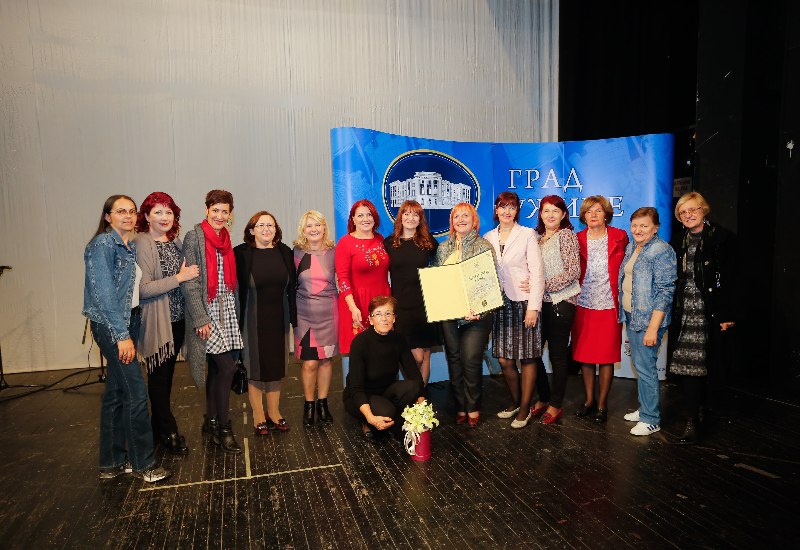

Leave a comment